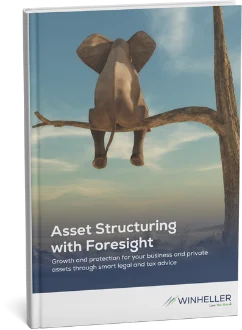Foundation Holdings in Germany: Establishment & Benefits
What is a holding company?
Experienced entrepreneurs often operate through holding structures. The GmbH holding company, where a GmbH serves as the parent company of various holding companies through which entrepreneurial activities are conducted and/or property investments are held, is a popular choice. The holding company can also invest in securities.
The entrepreneur and his family's private assets are distinct from these holding company assets. The entrepreneur uses the income earned in the holding company for his private lifestyle (family home, cars, living expenses) in this private sphere.

Foundation holding company or GmbH holding company?
A GmbH holding company can provide a tax-efficient solution for the entrepreneur, offering clarity, structure, and sustainable, healthy asset growth. However, a GmbH holding company is typically a temporary solution. A foundation holding company has several advantages over a GmbH holding company and is a permanent solution.
Tax advantages of a holding foundation in Germany compared to a holding GmbH
- Current income tax
Unlike GmbHs, family foundations are not subject to trade tax due to their legal form. Exceptions occur if a foundation is commercially active, which is often not the case in a holding structure. The current tax burden of a foundation is therefore limited to 15.825 percent corporation tax. In contrast, a GmbH, except for a purely asset-managing real estate GmbH, must also pay trade tax, resulting in a tax burden of around 30 percent.
- Rental income from real estate
Even property-managing GmbHs with a more favorable tax position (tax rate of only 15.825 percent) often cannot permanently avoid trade tax. In practice, unsuccessful arrangements that negate the supposed tax benefits of an asset-managing real estate GmbH (then: approx. 30 percent tax burden) are frequently encountered. It requires a lot of discipline and tax knowledge to continuously meet the conditions leading to the trade tax exemption of the real estate GmbH. In contrast, the tax situation of a foundation holding company investing in property is simple: due to the lack of commerciality, only 15.825 percent tax is always payable on rental income in the foundation.
- Sale of real estate
The sale of real estate within a foundation is also advantageous: within the ten-year speculation period, it is also taxable at 15.825 percent (GmbH: approx. 30 percent). After a holding period of ten years, sales are even tax-free - just like private assets (GmbH: 30 percent). However, a foundation must also ensure not to become commercial by buying and selling too frequently (so-called commercial property trading).
- Investment gains
Income from dividends and gains from the sale of corporate shares (GmbH shares, stocks) are subject to a favorable tax rate of approximately 1.5 percent in a GmbH. This is applicable to dividends if the GmbH holds at least 15 percent of the investment company. A foundation, conversely, pays around half of this, i.e. approximately 0.75 percent, due to the absence of trade tax liability. This also applies to dividends if the shareholding in the holding company is at least 10 percent or more.
Asset protection and security through the foundation holding
While tax advantages are important, entrepreneurs also seek security for themselves and their families. They ponder over what will happen to their family if the company encounters issues. Conversely, they worry about their company(ies): What will transpire if private risks such as illness, divorce, or creditor claims materialize? Will these risks impact the company and various investments?
The GmbH holding company only protects the private sphere from risks in the business environment: if an investment in the holding company becomes insolvent, if there are issues with one or more property projects or if creditors take action against an investment company or individual investments, these risks remain within the holding company. Typically, there is no access to the private sphere and the family.
A foundation holding company also provides protection in the other direction: if a creditor accesses the entrepreneur's private assets, e.g. because a claim for damages in the millions is made against him from a managerial or honorary position, it is not possible to access the holding company. The same applies to other risks, e.g. in the event of a divorce of the entrepreneur's marriage: as the entrepreneur cannot have a stake in “his” foundation (foundations have no shareholders/owners), a third party cannot “foreclose” on these non-existent shares, unlike in the case of a GmbH holding company: as the entrepreneur is a shareholder in the GmbH holding company, the shares in the holding company and therefore the entire holding company assets are available to creditors as a liability asset.
Permanent succession solution through foundation holding company
One of the biggest challenges in the life of an entrepreneur is succession planning: What should happen to my assets when I am no longer around?
The question of succession is only partially answered with the establishment of a GmbH holding company. Instead of having to distribute a large number of individual investments (shareholdings, property, portfolios, etc.) among the descendants, with a GmbH holding company the question revolves around who should receive how many shares in the holding company and when. This considerably reduces the complexity. However, the tax risks inherent in the shares remain high. If the entrepreneur passes away without detailed tax planning beforehand, there is a risk of considerable tax burdens: With assets of, for example, EUR 20 million tied up in the shares of the GmbH holding, the tax rate in the most favorable tax class I (heirs are, for example, the spouse and children) is already 27 percent. Typically, this triggers forced sales within the holding structure and taxable distributions in a considerable amount from the holding in order to fulfill the tax liability. If the entrepreneur passes away unmarried and bequeaths his estate to his partner, the tax rate would be as high as 50 percent due to the less favorable tax class III!
In contrast, the benefit of a foundation holding company is that the assets are already transferred to the foundation at the time of its establishment. Even though the entrepreneur and his family are the beneficiaries of these assets, the entrepreneur does not directly own them, as a foundation does not have any owners. The foundation is self-owned. Private risks, such as the entrepreneur's death, do not impact the foundation. There are no shares in the foundation that would need to be inherited and taxed. In other words: The inheritance tax and gift tax audit, which is still required for the GmbH holding company after establishment, is already completed with the establishment of the foundation.
What’s the downside?
During its formation, a foundation holding company needs more intensive advisory services than a GmbH holding company. This is mainly because, in the case of a foundation holding, not only income tax issues but also inheritance/gift tax issues need to be addressed - i.e., the audit needs to be conducted, which is done later for a GmbH solution. Therefore, the effort and costs for setting up a foundation holding are higher.
The foundation holding company also requires more guidance as the legal form of a foundation is usually less familiar to the entrepreneur than that of a GmbH. The fact that the entrepreneur does not hold any shares in “his” foundation and that the articles of association are less flexible than those of a GmbH are also factors that the entrepreneur needs to understand before deciding in favor of a foundation holding company.
Substitute inheritance tax for foundation holding
Lastly, foundations - unlike limited liability companies - are subject to a unique tax: the so-called substitute inheritance tax (Erbersatzsteuer). Because shares in foundations do not exist and therefore cannot be transferred to descendants (subject to tax) by way of inheritance, the legislator has introduced this special type of tax. Every 30 years, it simulates an inheritance that triggers taxes. The advantage of this is that, unlike the death of the entrepreneur, the time at which inheritance tax is triggered can be predicted to the day. This gives you all the time in the world to optimize the tax situation and, in the best case scenario, avoid taxation altogether by transferring the assets to tax-privileged business assets before the cut-off date, for example.
Our consulting services for foundation holdings in Germany
Option 1 - Setting up a foundation holding company from the outset:
Few entrepreneurs consider establishing a holding structure from the outset. Even fewer entrepreneurs already have a holding foundation in mind. We will be happy to advise you right from the start on how to structure your assets correctly - regardless of the result and possible legal forms (GmbH holding company, foundation holding company, family partnerships, etc.). The decisive factor is what is right for you.
Option 2 - Optimization and reorganization of existing corporate structures:
Experienced entrepreneurs can rely on our advisory services to restructure their assets. We advise you and design a sustainable and tax-optimized structure for you from A to Z, into which we transfer your existing assets. If you have already set up a holding structure, we will discuss with you whether it makes sense to consider further optimization, including a foundation holding.
Your attorney and tax advisor for the foundation holding company
We will be happy to assist you in setting up the right holding structure for you and, if necessary, establish a foundation holding company. Together with our tax advisors, we will work with you to plan a holding and corporate structure that is optimized in terms of tax and liability and offers you both stability and the necessary freedom and flexibility that you value as an entrepreneur.
The most convenient method to reach us is via e-mail (info@winheller.com) or telephone (+49 69 76 75 77 85 22). Don't hesitate to get in touch with your queries.
Do you need support?
Do you have questions about our services or would you like to arrange a personal consultation? We look forward to hearing from you! Please fill in the following information.
Or give us a call: +49 69 76 75 77 85 22







